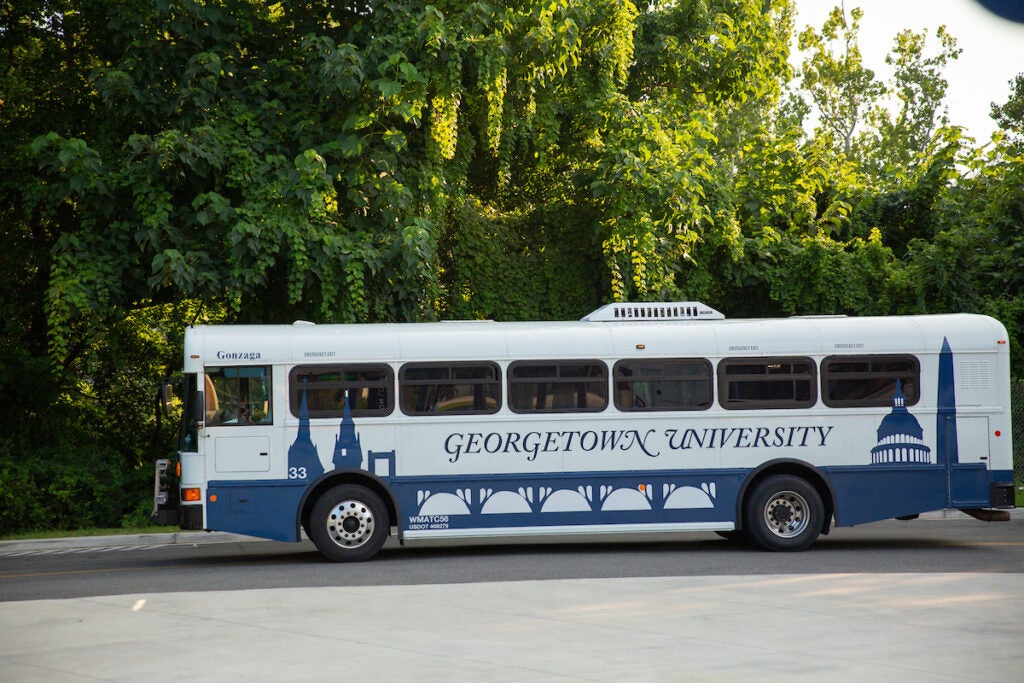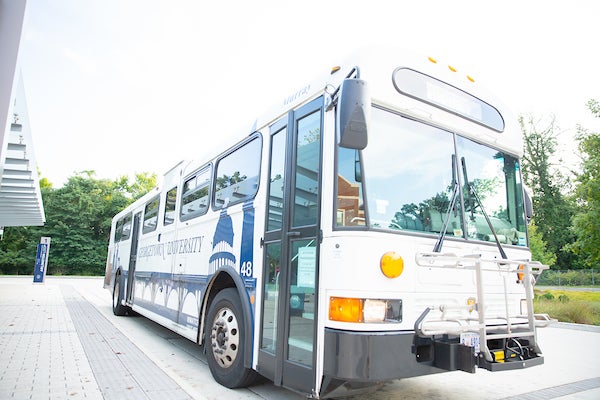Transportation

Sustainable Mobility
Georgetown recognizes the multiple benefits associated with more sustainable transportation. We make the campus accessible for faculty, staff, students and visitors through many convenient transportation options, and offer an online transportation portal at transportation.georgetown.edu to help the campus community make convenient and sustainable choices.
Benefits of Sustainable Transportation
Dependence on automobiles can lead to negative effects such as air pollution, increased greenhouse gas emissions, roadway congestion and high infrastructure costs. Alternatives like those described below can help reduce these environmental impacts, and also promote other personal benefits like physical wellness through increased daily activity (such as walking and biking), and reduced financial costs associated with owning, parking and maintaining a private automobile.
Sustainability and GU’s Campus Fleet

Georgetown’s campus fleet integrates alternative-fuel vehicles:
- Biodiesel – A biodiesel blend – B20 when available – is used in all diesel-burning vehicles in the campus fleet, including the University-run (GUTS) shuttle buses and the campus-operated waste collection trucks.
- Electric utility vehicles – The University’s fleet of golf carts for local travel around campus contains 40 electric vehicles.
- Electric Plug-in Passenger Cars – Georgetown participated in a research initiative with the Toyota Motor Company to test-drive prototype electric plug-in Priuses during 2010 and 2011.
- During that time, two Plug-In Hybrid Electric (PHEV) Prius prototypes, provided by Toyota, were tested for several months each by volunteer drivers selected from our faculty and staff. The initiative helped gather real-world data about electric passenger vehicle use.
- As part of the electric vehicle test-drive program, two “Level 2” charging stations have been installed in Garage 4. Inquire with the Office of Transportation Management to learn more about how Georgetown staff and faculty driving electric vehicles can access these stations.
- By taking part in this initiative, the university took a step closer toward accommodating electric vehicle use, thereby advancing our sustainability goals as electric vehicles consume and burn less or no petroleum per mile driven and produce no tailpipe emissions.
- Bicycle Patrol – GUPD officers use bicycles to quickly traverse the campus as they promote safety and security.
Sustainable Commuting
In many ways, sustainable transportation comes naturally to Georgetown. As an urban campus with constrained access to land, the University strives to minimize surface parking and use our limited land resources for other purposes that serve our mission, and in recent years a number of surface parking lots have been converted to higher-use buildings and facilities. That goal dovetails well with our sustainability efforts, in that we make it a priority to provide our students, faculty, staff and visitors with convenient alternatives to single-occupancy vehicle use.
As of 2014, nearly two-thirds of our campus commuters arrive to work and class by means other than driving alone, and by policy , undergraduate students do not have cars at Georgetown.
The university provides a number of convenient options for sustainable and alternative transportation to and from campus, including our free university shuttle, public transportation, bicycling, car-sharing, and other means.
Transportation Planning
As part of its ongoing master planning process, Georgetown is planning for transportation investments that will improve access to and around campus and make the Main Campus more pedestrian and bicycle friendly. The university has adopted core planning principles of creating a pedestrian-friendly campus and improving transportation modes and means into campus.
Through ongoing Transportation Demand Management (TDM) planning, the university is developing strategies to reduce traffic congestion, parking demand and vehicle miles traveled, with benefits to air quality, human health and sustainability. Additionally, GU has been a stakeholder in the Georgetown Business Improvement District’s (BID) 15-year strategic planning process, which included an emphasis on the future of transportation. Through this effort, GU has voiced support for exploring a number of alternative transportation solutions such as a streetcar, an additional metro stop and increased bicycle connections with local trail systems.
Bicycle-Friendly Campus
In 2013, GU was recognized by the League of American Bicyclists as the first Bicycle-Friendly University in the District of Columbia, in recognition of initiatives such as free showers offered for bicycle commuters on campus, installation of bicycle repair stands on campus, regular safe-cycling classes offered on campus, and plans to increase secure, covered bicycle storage in future construction.
5% percent of Georgetown University commuters get to Georgetown by bike, almost twice the average mode split for the rest of the city!
There are over 100 bicycle racks with over 1,000 total bicycle parking spots on campus! Bicycling is a key component of Georgetown’s sustainable transportation mix. Biking on campus, whether for commuting or just for fun, supports healthy lifestyles among our campus community members while using fewer resources and promoting a healthier planet.
More information on transportation for students, staff, faculty, and visitors
Visit transportation.geogetown.edu to learn more!